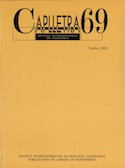The formal lexical model of Constantí Llombart
DOI:
https://doi.org/10.7203/caplletra.69.17264Keywords:
history of the Catalan language, history of the Catalan lexicon, literary language Abstract
Abstract
Our aim in this contribution is to focus attention on the lexical model of Constantí Llombart, one of the main representatives of the Renaixença (19thC. Catalan Renaissance) in Valencia. Llombart wanted to extend this movement of cultural recovery to the whole of Valencian society. And that is why he proposed for literary language a linguistic model of synthesis, avoiding the vulgar forms and the Spanish forms of the colloquial language, but also the archaisms that could distance it from the popular sectors. In the lexical purity of the literary language, Llombart took into account the classical writers and the Catalan writers of the Renaixença, as well as the lexicographic sources, especially the dictionaries of Carles Ros and Josep Escrig, and surely also that of Labèrnia. Without renouncing the popular and dialectal lexicon, he proposed the literary recovery of traditional words, which were unused or decadent, and that experienced the competence of Spanish forms, and he incorporated neologisms and words introduced in the literary Catalan language during the 19th century.
 Downloads
Downloads
Downloads
Published
How to Cite
-
Abstract647
-
PDF (Català)527
Issue
Section
License
Authors submitting work to Caplletra for publication must be the legitimate holder of the usage rights. Legitimacy for the purposes of publishing the work must also include images, tables, diagrams and any other materials that may complement the text, whether they are the author of such material or not.
Copyright: on publishing their work in the journal, the author grants Caplletra. Revista Internacional de Filologia usage rights (reproduction, distribution and public communication) for both the paper printed version and for the electronic version.
All work published in Caplletra is covered by the Creative Commons license type Attribution-NonCommercial-NoDerivatives 4.0 (CC BY-NC-ND 4.0).
RESPONSABILITY
Caplletra. Revista Internacional de Filologia does not necessarily identify with the points of view expressed in the papers it publishes.
Caplletra. Revista Internacional de Filologia accepts no responsibility whatsoever for any eventual infringement of intellectual property rights on the part of authors.






